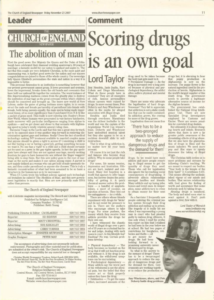Church of England Article By Lord Taylor of Warwick
 Jimi Hendrix, Janis Joplin, Kurt Cobain and Diego Maradona. What do these people have in common? They are all examples of rich, famous personalities whose careers were ruined by drugs. In more recent times, Pete Doherty and Amy Winehouse are often in the media for alleged association with illegal drugs.
Jimi Hendrix, Janis Joplin, Kurt Cobain and Diego Maradona. What do these people have in common? They are all examples of rich, famous personalities whose careers were ruined by drugs. In more recent times, Pete Doherty and Amy Winehouse are often in the media for alleged association with illegal drugs.
Hendrix and Joplin died through overdoses. Maradonna was the richest footballer in the world and was the captain of the Argentinian World Cup winner’s team. Doherty and Winehouse have undoubted musical talent but they also appear to be on a reckless downhill slide to self-destruction.
That is what drug addiction is, no matter how fat your bank account. Of course it is not just the rich and famous who become drug addicts. Why do some people take drugs?
For some, life means tension, depression and frustration. Others are hurt, isolated and confused. Many feel hopeless in a world that appears to offer happiness, but forever denies the possibility of getting it. A quick chemical answer solves the problems – a handful of amphetamines, a snort of cocaine, an injection of heroin. They blot out the unhappiness – for a while.
There are others whose friends experiment with drugs for kicks’ and do not resist the pressure to join in. There are the pushers who encourage others to take drugs. For some pushers, the money which they receive from addicts provides the drugs for their own use.
I have witnessed the chaotic world of illegal drugs over a period of 20 years as a criminal barrister and judge, dealing with such cases in court. Is this lifestyle fun? Exciting? No way Certain problems develop:
• Physical dependency – The body becomes so hooked on the drug that it will not function properly without it. If the drug is not available, the withdrawal symptoms can be excruciating.
• Psychological dependency – Many addicts say the worst part of the withdrawal is not the physical pain, but the belief that they cannot act or think properly unless they have the drug.
• Habituation – To get the same effect, increased amounts of the drug need to be taken because the body just gets used to it.
• Permanent Damage – As the drug is increased over a long period because of physical and psychological dependency; the addict often suffers physical and mental damage.
There are some who advocate the legalisation of hard drugs. Nonsense! They fail to appreciate that addiction is not a static condition that can be easily contained. As addiction grows, the craving for more of the drug grows.
Legalisation does not mean free drugs. So we would have more addicts and more people resorting to illegal means to get the quantity of drugs they need. Those who call for legalization also ignore the far-reaching social consequences of drug-taking. It adversely affects relationships amongst families and friends. Many addicts end up losing jobs, homes and loved ones. In desperation, some addicts turn to crime to obtain money for their next ‘fix’.
As a barrister, I frequently saw people entering the criminal justice system through their drug addiction and ending up in prison. The tragedy of it really hit me when I was representing a young man in court who had pleaded guilty to various drug offences. It was only when I read the probation report on him that I realized he had been in the year below me at school. He had two pages of convictions for burglaries, robberies and thefts – all to get money for drugs. He had been looking forward to a promising university career. All destroyed by drugs.
So what is the answer to the menace of drugs? There has to be a two-pronged approach to reduce the supply of dangerous drugs and the demand for them. Governments are working together to reduce the production of drugs but, it is alarming to hear that poppy production in Afghanistan is now on the increase. The poppy flower is the natural ingredient used in the production of heroin. Afghanistan is the world’s largest supplier of this death drug. The government needs to provide a legitimate alternative source of income for the Afghan farmers.
The government has established the National Drug Intelligence Unit. There are now Specialist Drug Investigators employed by Customs and Excise. There are severe penalties for convicted drug dealers.
But ultimately, it is about changing hearts and minds. Research shows that there is now a far greater public awareness of the devastating effects of drug abuse. But we also have the glamorisation of drugs in films and the music industry. We need more pop and film stars to openly denounce the talking of illegal drugs.
The Christian faith invites us to meet problems and stresses by following Christ’s teaching. We are meant to respect our bodies: “Your body is the temple of the Holy Spirit” [1 Corinthians 6:19]. This means offering the undiminished vigour of our minds and bodies. That secure relationship with God gives the feeling of worth and acceptance that some forlornly seek by taking drugs.
Abusing drugs is unnatural. The body and mind soon start to react against it. Don’t push against a river, flow with it.